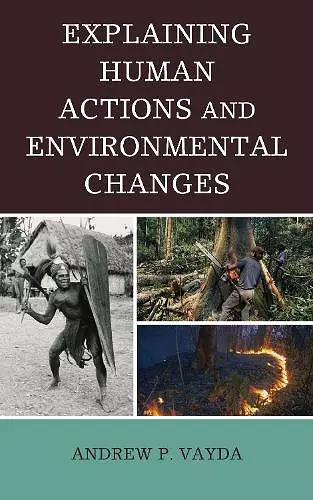Explaining Human Actions and Environmental Changes
Format:Hardback
Publisher:AltaMira Press
Published:16th Jun '09
Currently unavailable, and unfortunately no date known when it will be back

In this collection of recent essays, Andrew P. Vayda argues for a pragmatic approach to explanation and explanation-oriented research in social and environmental sciences. He supports his arguments with causal analyses of both human actions, such as cutting down trees and fighting over resources, and environmental changes, such as forest fires; and he voices his opposition to methodological and ethnographic holism and the notion that explanation can be achieved by deploying theories rather than by obtaining evidence of the causal histories of concrete actions and events. Vayda is critical of much recent scholarship_in such areas as political ecology, local knowledge studies, discourse studies, and evolutionary human behavioral ecology_for its indifference to questions of evidence and methodology and its failure to give proper consideration to multiple and alternative possible causes of whatever is being explained. He also discusses the use and misuse of evidence and generalizations, the payoffs and pitfalls of moving from one level of analysis to another, the dos and don'ts in interdisciplinary research, the uses of statistics, and the importance of being clear about objects of explanation. This original and challenging work makes sense of the future of ecological anthropology and will be of interest to researchers in the social and environmental sciences in general.
This book represents decades of candid reflection on human-environment relations. It is a welcome challenge to the 'interpretation' focus that dominates currently, evident in fashionable political ecology. Pete Vayda—who needs no introduction to those familiar with the field—has consistently argued for empirically grounded 'explanation' (asking 'why-questions,' as he puts it ) supported by rigorous appraisal of available evidence. He refines his argument here, in an approach he now calls 'causal explanation,' and explores its methodological implications. I warmly recommend the book to all those with an interest in human ecology as a thought-provoking read. -- Paul Sillitoe, professor of anthropology, Durham University
This unusual book asks, among other things, what causes forest fires in Indonesia, what prompts tribal warfare, and why does tropical deforestation happen? Unlike most books that span such a diverse set of topics, however, the purpose here is not to present a grand theory—just the reverse. Andrew P. Vayda, who has been a pioneer in the development of environmental anthropology and human ecology over the past half-century, eschews grand theories, theoretical fads, and bandwagons, arguing instead that we re-direct anthropological inquiry away from abstract explanation and toward concrete causes of events. Vayda asks, what should we study, how should we study it, and what claims can we make after we have done so? Both those who agree and those who disagree with Vayda's answers to these questions will welcome his call for greater self-interrogation regarding anthropological theory and method. -- Michael R. Dove, professor of social ecology, Yale University
This collection gives us insights into the hallmarks of Vayda's distinguished career: a fidelity to the details where human actions and environmental changes take place; an attention to the logic of the case informed by decades of advancements in the philosophy of science; and rigorous attention to the back-and-forth of explanation and methodology. Pete Vayda is social science's answer to Sherlock Holmes. His culprit is causation. -- professor of geography, John Paul Jones, III, University of Arizona
Explaining Human Actions and Environmental Changes successfully weaves together Vayda's extensive empirical work with concrete discussions of the nature of explanation in the social sciences. Vayda's pragmatic and contextual approach to explanation, applied to real issues in social research, seems to me precisely the right way to approach these issues, and the end product is a very interesting and helpful book. -- Harold A. Kincaid, professor of philosophy, University of Alabama at Birmingham
Vayda's significant critique …clears the way for the proposal of an explicitly event-based causal approach for understanding environmental changes. This important book should be required reading not only for human ecologists and ecological anthropologists, but also for all other social scientists concerned with environmental change. It will make for an exceptional and stimulating reading for students in graduate and advanced undergraduate courses addressing environmental issues and provide an excellent springboard for new research and understanding. * Human Ecology *
No other anthropologist has advanced environmental science to the extent that Pete Vayda has done, particularly with respect to how we study change and causation. Whether writing alone or in collaboration, he never fails to challenge the reader intellectually. This volume brings together some of his most provocative writings, all directed to explaining human behavior or environmental change. As reflected in these essays, his thinking has changed over the years but remains empirically grounded, extremely creative, and always important. This book should be required reading for anyone concerned with research design and explanation in the social and environmental sciences. -- Daniel Bates, editor, Human Ecology; emeritus professor, Hunter College, CUNY
This book is all about the truth, and not being distracted. It is an intellectual treatise built on solid scholarship hence the first word in the title-explaining-is most appropriate….As different as humans may be from other animals, we are still animals…. We are in every way part of nature. In the course of satisfying our needs we impact the environment around us-other parts of nature. Vayda's book is magnificent in its arguing the complexity of human actions, questioning the self-perceived uniqueness of disciplinary perspectives, arguing against focusing on certain factors assumed in advance to be important, pointing out failure in various explanations, untying the Gordian knot of processes typically treated superficially, demonstrating how different conclusions can be reached when asking different questions, and illustrating confusion stemming from polemics. * Dialogues In Human Geography *
ISBN: 9780759103238
Dimensions: 238mm x 161mm x 24mm
Weight: 624g
316 pages